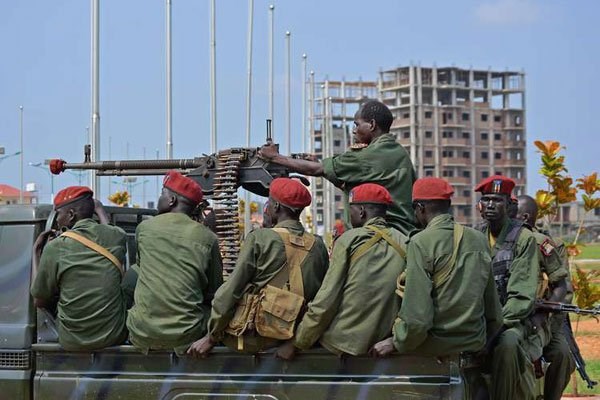A cross section of residents of the South Sudan capital, Juba, have voiced concerns over the worsening security situation following continued airstrikes in Nasir and Ulang counties in Upper Nile State by the Ugandan People’s Defence Forces (UPDF) and the recent bombardment of the SPLA-IO’s cantonment site in the Wunliet area west of Juba.
Taban Emmanuel, a resident of Munuki Block B, said the spread of alarming information on social media and the heavy presence of military forces in Juba indicate that the country is on the brink of returning to war.
“As a citizen of Juba, I am terrified. With the current situation we are witnessing, we fear that anything could happen at any time,” he said. “We do not know exactly when, but the warning signs are clear.”
Emmanuel urged the parties to the peace agreement to take immediate steps to restore calm and prevent the country from slipping into full-scale conflict.
Sebit Anthony, a resident of Juba’s Jebel Timan suburb, noted that while the deployment of soldiers in some parts of Juba caused panic, rumors on social media heightened fears as many people resorted to posting hate speech.
“The situation in Juba seems normal, however, we are just afraid that what is happening on social media is not good because you find a lot of negative information,” he stated. “I urge those in authority to refrain from misusing social media because hate speech is not good and can be used by those against peace. People interpret what leaders say in different ways. So, I am appealing to the politicians not to be involved in hate speech.”
According to Sebit, the deployment of security personnel for joint operations on the streets of Juba causes a lot of fear among citizens.
On Monday, SSPDF Spokesperson Genl Ruai accused the SPLA-IO led by First Vice President Dr. Riek Machar of provocation, which resulted in the bombing of the Wunliet cantonment site.
“It is very hard for some citizens who have come to the capital for the first time, especially when they see heavy security deployment along the streets and in some residential areas,” Sebit said.
For her part, a Juba dweller who identified herself only as Night, also expressed anxiety over the current tense security situation.
“The situation is not good because there are a lot of changes and everyone is just scared,” she lamented. “Sometimes you hear rumors that something is going to happen, and this causes a lot of fear.”
In response to the current crises in the country, Ter Manyang, the executive director of the Center for Peace and Advocacy (CPA), called on President Kiir and First Vice President Dr. Machar to consider dialogue instead of confrontation.
“I urge President Salva Kiir and First Vice President Dr. Riek Machar to choose dialogue and engage in face-to-face discussions rather than resorting to military solutions,” he said. “South Sudan cannot afford to go back to full-scale war. Based on my interactions with friends from the international community, Africa, and the Western world, South Sudan will be seen as a forgotten crisis if the leaders do not handle their internal affairs with wisdom.”
Ter said many South Sudanese were born in war, attended school during the war, and got married amidst conflict, and now their children are still experiencing war.
“This is not the country we desire,” he stated. “We want a nation where there is the rule of law, human rights, good governance, democracy, and enough food on the table for its citizens.”
When contacted for comment about the security situation, South Sudan National Police Service (SSNPS) Deputy Spokesperson Major Lith Wilson Simon said the police currently do not have any accurate information regarding the matter.




